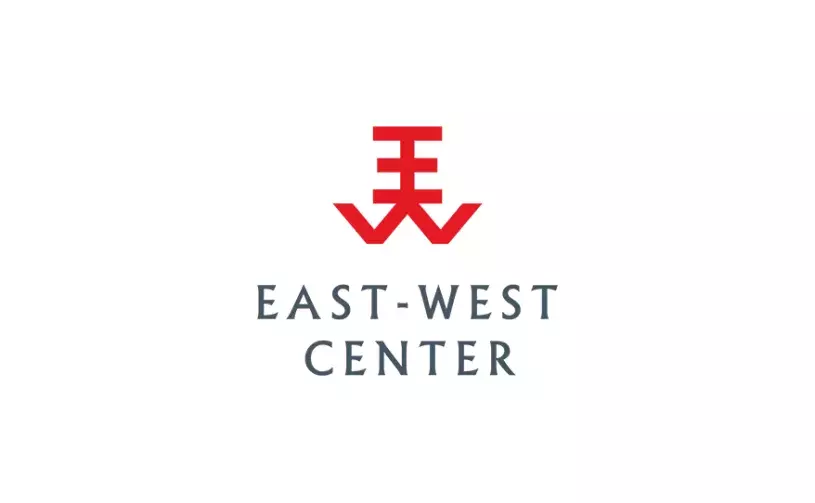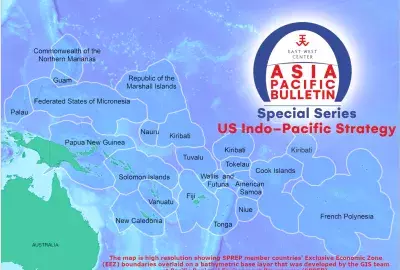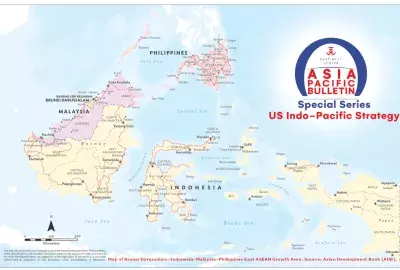Error message

|
Tiola, Senior Analyst at the S. Rajaratnam School of International Studies, Singapore, explains that “despite the lack of obvious maneuvers, Jokowi has brought fairly significant impacts to Indonesia’s foreign policy, albeit with two strong domestic anchors: economic pragmatism; and his vision to turn Indonesia into a Global Maritime Fulcrum“ |
On July 14, newly re-elected Indonesian incumbent President Joko ‘Jokowi’ Widodo delivered a speech on his visions for the second term, set to kick off in October 2019. The president’s speech did not touch upon foreign policy, a subject many have claimed to be his weakness. Expectedly, Jokowi focused his speech on infrastructure and economy — which reflects the administration’s main concerns since he first assumed presidential office in 2014. This does not mean, however, that Indonesia under Jokowi has been neglecting foreign affairs.
It is perhaps true that Jokowi has not been a president with a grand vision for foreign policy. His approach has been markedly different from his predecessor Susilo Bambang Yudhoyono, who took keen interest in multilateralism and foreign policy jargon, such as in his notion of ‘a thousand friends, zero enemies’, which signaled Indonesia’s activism as an honest broker in the region. Jokowi has not attended any UN General Assembly meetings since taking office, and has skipped many of the annual Bali Democracy Forum meetings — a platform initiated by Indonesia to promote discussions on democracy in the region.
However, despite the lack of obvious maneuvers, Jokowi has brought fairly significant impacts to Indonesia’s foreign policy, albeit with two strong domestic anchors: economic pragmatism; and his vision to turn Indonesia into a 'Global Maritime Fulcrum' (GMF) — an idea he launched during his first term that envisions Indonesia as a maritime power. Immediately after his inauguration in 2014, Jokowi asserted that he wanted a ‘people-centric diplomacy’ and instructed Indonesian ambassadors to focus on economic diplomacy. During an interview in June 2019, when asked about the ongoing US-China trade war, he responded that such circumstances provide opportunities for Indonesia to replace China as an exporter of various goods of the United States, and that he had ‘sent a team’ to the United States to discuss the issue. Last week, Indonesia outlined the link between China’s Belt and Road Initiative (BRI) and GMF, highlighting that under the framework, China will be involved in 10 major infrastructure projects across Indonesia worth $14 billion. This does not mean, however, that Indonesia has been taking Chinese investments without strategic calculations. The country has not been among the biggest beneficiaries of BRI, which Jakarta claims to be the case because it insists that any loan should be on a business-to-business basis, to avoid debt traps. Moreover, the administration is still somewhat cautious of Chinese investment, as sentiments against Chinese business still linger among Indonesians. But with Indonesia’s massive requirement for infrastructure, it is likely that the government will grow more lenient towards Chinese financing in the next decade.
The domestic angle of Jokowi’s foreign policy also manifests in the way Indonesia approaches issues in the South China Sea — although Jakarta simultaneously employs more direct foreign policies. Since his early presidential days, Jokowi has been waging a campaign against illegal fishing and implemented the controversial policy of sinking foreign vessels caught fishing illegally in Indonesian waters. Even though it mainly addresses Indonesia’s decline in fish production, the foreign policy dimension is inevitable. It signals a strong message toward neighbors, and has invited concerns from countries whose vessels have been sunk, including China. The same framing was used during a 2016 incident in which the Chinese Coast Guard prevented an Indonesian task force from towing a Chinese boat caught fishing illegally in Indonesia’s Natuna waters. In response to the incident, and in several similar incidents that followed (including with Vietnamese boats), the government framed the issue as ‘illegal fishing’ threats, instead of traditional security threats, and claimed the moves were for deterrence rather than retaliation. The move is understandable, considering Indonesia’s position as a non-claimant state; Indonesia is not willing to allow such clashes to develop into territorial disputes. Under GMF, the government has also been taking other domestic measures with apparent foreign policy aspects. In July 2018, for instance, the Coordinating Ministry of Maritime Affairs launched a new map in which Indonesia’s exclusive economic zone in the South China Sea is renamed the North Natuna Sea. Many, and almost certainly China, view the new map as challenging China’s nine-dash line.
Nevertheless, Indonesia’s foreign policy under Jokowi has not only been about pragmatism — the Ministry of Foreign Affairs has been rather autonomous in some areas of foreign policy. This is particularly evident in ASEAN's Outlook on the Indo-Pacific, initiated by Indonesia and adopted by ASEAN during its 34th Summit last June. Granted, for Indonesia, the concept of the Indo-Pacific was first publicly coined by former Foreign Minister Marty Natalegawa — who used the term during his 2013 speech in Washington DC. However, it was only under the Jokowi administration that the concept was institutionalized. The outlook is a clear effort of Indonesia and ASEAN to participate in shaping the geopolitical narrative in the Indo-Pacific, which has recently been flooded by concepts and strategies by non-ASEAN powers, such as U.S. Free and Open Indo-Pacific (FOIP). Through the Indo-Pacific outlook, Indonesia highlights ASEAN Centrality and the usual and expected ASEAN approach to regionalism: inclusivity, rules-based engagement, and emphasis on ASEAN-led mechanisms. Understandably, the document is somewhat ambivalent about both China and the United States — it does not mention either BRI or support for FONOPs, for instance. The document also puts special emphasis on maritime cooperation, which is in line with Indonesia’s Global Maritime Fulcrum vision. Although ASEAN has received many criticisms on the Indo-Pacific outlook — including that the concept is too abstract and lacks practical relevance — the need to assert the organization’s common perspective in the region is inevitable amidst various concepts of Indo-Pacific by extra-regional powers. After all, only so much could be done under ASEAN’s traditional architectures. Beyond ASEAN, Indonesia also shows foreign policy activism, most notably through its appointment as a non-permanent member of the UN Security Council from 2019 to 2020. On the humanitarian side, Indonesia was one of the first to arrive in Myanmar and Bangladesh following the new cycle of violence in August 2017; and has been channeling assistance to Muslim-majority countries, including assistance to Palestine, Bangladesh, the Rohingyas, and, to a lesser extent, Afghanistan.
Although domestic politics more often than not result in suboptimal foreign policies, Jokowi has demonstrated in the past four years — and is likely to continue in his second term — that national interests are never divorced from domestic practicalities.
|
Tiola, Senior Analyst at the S. Rajaratnam School of International Studies, Singapore, explains that “despite the lack of obvious maneuvers, Jokowi has brought fairly significant impacts to Indonesia’s foreign policy, albeit with two strong domestic anchors: economic pragmatism; and his vision to turn Indonesia into a Global Maritime Fulcrum“ |
On July 14, newly re-elected Indonesian incumbent President Joko ‘Jokowi’ Widodo delivered a speech on his visions for the second term, set to kick off in October 2019. The president’s speech did not touch upon foreign policy, a subject many have claimed to be his weakness. Expectedly, Jokowi focused his speech on infrastructure and economy — which reflects the administration’s main concerns since he first assumed presidential office in 2014. This does not mean, however, that Indonesia under Jokowi has been neglecting foreign affairs.
It is perhaps true that Jokowi has not been a president with a grand vision for foreign policy. His approach has been markedly different from his predecessor Susilo Bambang Yudhoyono, who took keen interest in multilateralism and foreign policy jargon, such as in his notion of ‘a thousand friends, zero enemies’, which signaled Indonesia’s activism as an honest broker in the region. Jokowi has not attended any UN General Assembly meetings since taking office, and has skipped many of the annual Bali Democracy Forum meetings — a platform initiated by Indonesia to promote discussions on democracy in the region.
However, despite the lack of obvious maneuvers, Jokowi has brought fairly significant impacts to Indonesia’s foreign policy, albeit with two strong domestic anchors: economic pragmatism; and his vision to turn Indonesia into a 'Global Maritime Fulcrum' (GMF) — an idea he launched during his first term that envisions Indonesia as a maritime power. Immediately after his inauguration in 2014, Jokowi asserted that he wanted a ‘people-centric diplomacy’ and instructed Indonesian ambassadors to focus on economic diplomacy. During an interview in June 2019, when asked about the ongoing US-China trade war, he responded that such circumstances provide opportunities for Indonesia to replace China as an exporter of various goods of the United States, and that he had ‘sent a team’ to the United States to discuss the issue. Last week, Indonesia outlined the link between China’s Belt and Road Initiative (BRI) and GMF, highlighting that under the framework, China will be involved in 10 major infrastructure projects across Indonesia worth $14 billion. This does not mean, however, that Indonesia has been taking Chinese investments without strategic calculations. The country has not been among the biggest beneficiaries of BRI, which Jakarta claims to be the case because it insists that any loan should be on a business-to-business basis, to avoid debt traps. Moreover, the administration is still somewhat cautious of Chinese investment, as sentiments against Chinese business still linger among Indonesians. But with Indonesia’s massive requirement for infrastructure, it is likely that the government will grow more lenient towards Chinese financing in the next decade.
The domestic angle of Jokowi’s foreign policy also manifests in the way Indonesia approaches issues in the South China Sea — although Jakarta simultaneously employs more direct foreign policies. Since his early presidential days, Jokowi has been waging a campaign against illegal fishing and implemented the controversial policy of sinking foreign vessels caught fishing illegally in Indonesian waters. Even though it mainly addresses Indonesia’s decline in fish production, the foreign policy dimension is inevitable. It signals a strong message toward neighbors, and has invited concerns from countries whose vessels have been sunk, including China. The same framing was used during a 2016 incident in which the Chinese Coast Guard prevented an Indonesian task force from towing a Chinese boat caught fishing illegally in Indonesia’s Natuna waters. In response to the incident, and in several similar incidents that followed (including with Vietnamese boats), the government framed the issue as ‘illegal fishing’ threats, instead of traditional security threats, and claimed the moves were for deterrence rather than retaliation. The move is understandable, considering Indonesia’s position as a non-claimant state; Indonesia is not willing to allow such clashes to develop into territorial disputes. Under GMF, the government has also been taking other domestic measures with apparent foreign policy aspects. In July 2018, for instance, the Coordinating Ministry of Maritime Affairs launched a new map in which Indonesia’s exclusive economic zone in the South China Sea is renamed the North Natuna Sea. Many, and almost certainly China, view the new map as challenging China’s nine-dash line.
Nevertheless, Indonesia’s foreign policy under Jokowi has not only been about pragmatism — the Ministry of Foreign Affairs has been rather autonomous in some areas of foreign policy. This is particularly evident in ASEAN's Outlook on the Indo-Pacific, initiated by Indonesia and adopted by ASEAN during its 34th Summit last June. Granted, for Indonesia, the concept of the Indo-Pacific was first publicly coined by former Foreign Minister Marty Natalegawa — who used the term during his 2013 speech in Washington DC. However, it was only under the Jokowi administration that the concept was institutionalized. The outlook is a clear effort of Indonesia and ASEAN to participate in shaping the geopolitical narrative in the Indo-Pacific, which has recently been flooded by concepts and strategies by non-ASEAN powers, such as U.S. Free and Open Indo-Pacific (FOIP). Through the Indo-Pacific outlook, Indonesia highlights ASEAN Centrality and the usual and expected ASEAN approach to regionalism: inclusivity, rules-based engagement, and emphasis on ASEAN-led mechanisms. Understandably, the document is somewhat ambivalent about both China and the United States — it does not mention either BRI or support for FONOPs, for instance. The document also puts special emphasis on maritime cooperation, which is in line with Indonesia’s Global Maritime Fulcrum vision. Although ASEAN has received many criticisms on the Indo-Pacific outlook — including that the concept is too abstract and lacks practical relevance — the need to assert the organization’s common perspective in the region is inevitable amidst various concepts of Indo-Pacific by extra-regional powers. After all, only so much could be done under ASEAN’s traditional architectures. Beyond ASEAN, Indonesia also shows foreign policy activism, most notably through its appointment as a non-permanent member of the UN Security Council from 2019 to 2020. On the humanitarian side, Indonesia was one of the first to arrive in Myanmar and Bangladesh following the new cycle of violence in August 2017; and has been channeling assistance to Muslim-majority countries, including assistance to Palestine, Bangladesh, the Rohingyas, and, to a lesser extent, Afghanistan.
Although domestic politics more often than not result in suboptimal foreign policies, Jokowi has demonstrated in the past four years — and is likely to continue in his second term — that national interests are never divorced from domestic practicalities.







